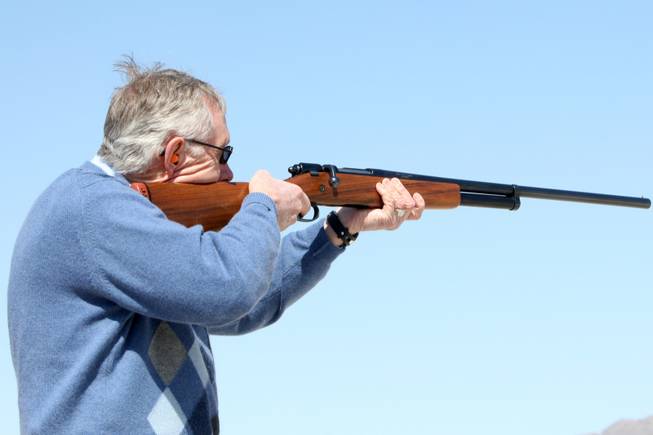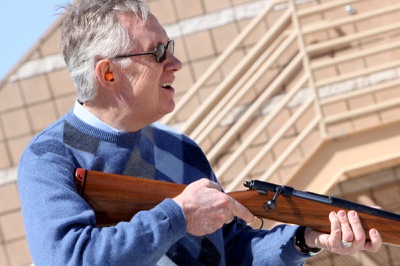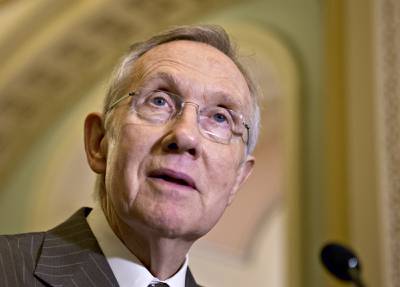
Sen. Harry Reid shoots his personal 12-gauge shotgun during the grand opening of the Clark County Shooting Park in Las Vegas Saturday, March 27, 2010.
Friday, Dec. 28, 2012 | 2 a.m.
Sun coverage
Senate Majority Leader Harry Reid is a gun man, always has been.
And although the Nevada native has welcomed the call by President Barack Obama to respond to the Newtown, Conn., massacre with action, Reid has yet to endorse — or even utter the phrase — “gun control.”
Obama expects Reid to get the gun control legislation he’ll announce in January through Congress. Polls show a majority of Americans want Congress to act to regulate firearms after the Dec. 14 killings of 20 children and six adults at Sandy Hook Elementary School.
But before Reid can whip up votes on measures to scale back access to guns, he has to wrestle with the issue himself.
“He’s a gun guy,” one of Reid’s closest confidants said. “But I think he recognizes that times have changed.”
Reid said he grew up with a gun in his hands.
“Growing up as I did in Searchlight, we didn’t go on vacations, we didn’t do things I guess a lot of other people around the country did ... but I can remember all four Reid brothers, we took a ride out to Paiute Springs and we shot doves,” Reid told a Nevada audience at a 2010 ribbon-cutting for a shooting range he had secured federal funds to build. “We had such a wonderful, wonderful time. ... People who criticize this probably would criticize baseball or football or soccer.”
Reid’s childhood shooting birds for sport and hunting jackrabbits his grandmother used in stew is a common narrative among Westerners.
Guns played an important and recurring role in his adult life, too. Reid carried a gun for work as a Capitol Police officer while he was in law school. He carried a gun for protection while he was chairman of the Nevada Gaming Commission and while working as a prosecutor trying to put mob bosses behind bars.
Guns, their role in everyday life and the extent to which that right is protected by the Second Amendment were matters Reid simply didn’t question, according to those who worked with him — not after Columbine; not when the assault weapons ban expired (he’d voted against it); and not after Virginia Tech, the country’s deadliest single-shooter assault, happened in the first year of his majority leadership in the Senate.
“I haven’t seen him spend a lot of time wrestling with this issue over the years,” said a former aide who was close with Reid. “In years past he’s largely ended up toeing the NRA line. But I’m not convinced that’s going to happen this time.”
Twenty dead 6- and 7-year-olds, killed by a high-capacity semiautomatic rifle, are making many lawmakers who never thought twice about gun laws revisit the issue.
Adam Lanza, 20, went to the school after having shot his mother to death at her home. At the school, he killed 20 first-graders and six of the women who taught them before turning his guns on himself.
As the stunned New England town has buried its dead in the days since, some lawmakers in Washington have, for the first time, called for a conversation about gun control.
The shift started with long-silent supporters such as the president, who said he believed in gun control during his 2008 campaign but has eschewed any official conversation about it while in office.
“A majority of Americans support banning the sale of military-style assault weapons. A majority of Americans support banning the sale of high-capacity ammunition clips. A majority of Americans support a law requiring background checks before all gun purchases so that criminals can’t take advantage of legal loopholes,” Obama said just days after the killings. “I urge the new Congress to hold votes on these measures next year in a timely manner.”
But voices for gun control also included avid hunters and National Rifle Association members, such as Sen. Mark Warner, a Virginia Democrat, and Joe Manchin, a West Virginia Democrat.
“I’m a proud outdoorsman and huntsman, like many Americans, and I like shooting, but this doesn’t make sense,” Manchin told MSNBC. “I don’t know anyone in the sporting and hunting arena who goes out with an assault rifle; I don’t know anyone who needs 30 rounds in the clip to go hunting.”
Even where staunchly pro-gun lawmakers have refused to support regulation, something unusual is happening: public distancing from the NRA, which has called for placing armed guards in schools in response to Newtown.
Reid has maintained a mixed relationship with the NRA, the gun industry’s strong lobbying arm that wields considerable influence in Washington through generous campaign donations and ideological appeals.
Reid has maintained a “B” average NRA rating, pretty high for a Democrat, and although he has never received the NRA’s endorsement in a Senate race, he usually receives its money — even rarer for a Democrat.
Reid voted against the assault weapons ban; applauded the Supreme Court’s recent pro-gun decisions in District of Columbia v. Heller and McDonald v. Chicago; and worked closely with the NRA to promote gun sports, such as securing federal funding for the Clark County Shooting Range.
But Reid hasn’t drawn a hard line in the sand on gun control like other advocates: He worked hard to promote Obama’s nominations of Sonia Sotomayor and Elena Kagan to the Supreme Court despite the fact that both thought the Second Amendment allowed for greater regulation of guns than Reid. Reid also is waging a one-man fight for the federal court nomination of Elissa Cadish, whom Nevada Republican Sen. Dean Heller has prevented from being considered because he takes issue with her written opinions about gun control and the Second Amendment.
Reid also staunchly supports Obama’s call to move toward a comprehensive response to recent mass shootings in Newtown; Portland, Ore.; Aurora, Colo.; and Oak Creek, Wis., that includes gun control, but he has resisted invitations to express his opinion on any changes in firearm regulation.
His office turned down a request to interview Reid for this article and did not respond to questions about Reid’s stance or current relationship to guns — not even to clarify how many he owns, whether he keeps any in D.C. and how often he shoots.
But former aides said there’s a reason for all the hush-hush.
“Reid’s got a responsibility as a majority leader to not get ahead of the (Senate Democratic) caucus,” a close former aide said. “It doesn’t mean that he can’t change, but he’s got to do it more carefully than most.”
Reid has many Democratic colleagues with pro-gun records and “A” ratings from the NRA. Among them are at least three who are facing tough re-election races in states where a change of heart on guns could cost them: Mark Begich of Alaska, Max Baucus of Montana and Tim Johnson of South Dakota. Another four with unfavorable NRA ratings — Mark Pryor of Arkansas, Mary Landrieu of Louisiana, Kay Hagan of North Carolina and Jay Rockefeller of West Virginia — are facing close races where a vote for gun control could be turned into a negative campaign issue. The political challenges they face are part of what is driving Reid’s nonspecificity on gun control.
If Reid were to shift his gun-control stance, it wouldn’t be his first behind-the-scenes change of heart on an issue.
Most recently, Reid became a supporter of gay rights.
In the 1990s, Reid voted for establishing the military’s “Don’t Ask, Don’t Tell” policy banning public disclosure of homosexuality and voted to define marriage as exclusively between a man and a woman in the Defense of Marriage Act. For years since, Reid’s official position was to defer to the Mormon church on matters of equality for gays.
But in 2010, Reid was the chief force behind a successful push to repeal “Don’t Ask, Don’t Tell,” and this year he said he would vote to legalize gay marriage if it were ever presented to him on a ballot.
Before that, Reid had a full conversion on immigration.
Twenty years ago, Reid was a dogged opponent of immigration reform, waging an unsuccessful battle to end birthright citizenship, which he likened to “offering a reward” for breaking the country’s immigration laws.
“Is it any wonder that two-thirds of the babies born at taxpayer expense at county-run hospitals in Los Angeles are born to illegal alien mothers?” Reid said in a scathing 1993 Senate speech.
His wife, Landra, later told him he was wrong. Six years later, in an interview with the Las Vegas Review-Journal, Reid characterized his speech and the bill behind it as “short-sighted,” a “mistake,” and said he was “embarrassed that he made such a proposal.”
Reid is now one of the leading voices for immigration reform. He won the 2010 race for Senate largely because of the confidence Nevada Hispanics had in him for pushing so hard to pass the Dream Act.
In each of those matters, former aides said, an event, a person or an outside force Reid encountered changed his mind.
On gay rights, former aides said, Lt. Dan Choi, an Iraq war veteran who was discharged from the Army National Guard after he revealed his homosexuality, played a significant role in Reid’s change of heart. Choi gave Reid his West Point graduation ring in mid-2010 to hold onto until “Don’t Ask, Don’t Tell” was repealed. Reid returned it to him that December.
On immigration, it was Landra Reid and the growing Hispanic community in Nevada who made him rethink his stance.
“He’s a superior listener, reader and observer of truth. ... He takes it all in, he hears and processes everything usually before a person is done speaking,” one close confidante said. “He doesn’t weigh it all equally; he has his own internal scale and an unbelievable ability to balance a lot of incoming information.
“From there he decides. It’s not an emotionless process. In fact, I believe nearly all his decisions are rooted in core human dignities. And sometimes, one individual can have a lot of impact.”
Or in some cases, 20. If Reid changes his well-established opinion on gun control, former aides said, it will almost certainly be because of the children who perished in Newtown.



Join the Discussion:
Check this out for a full explanation of our conversion to the LiveFyre commenting system and instructions on how to sign up for an account.
Full comments policy